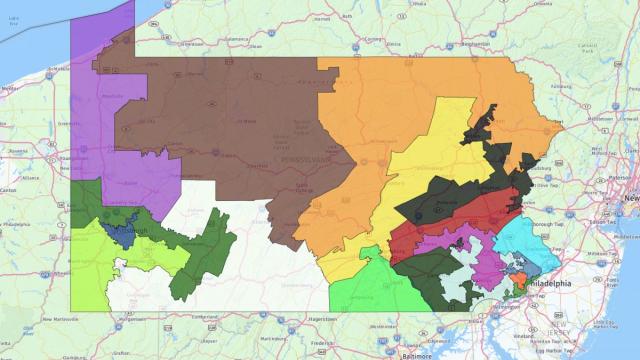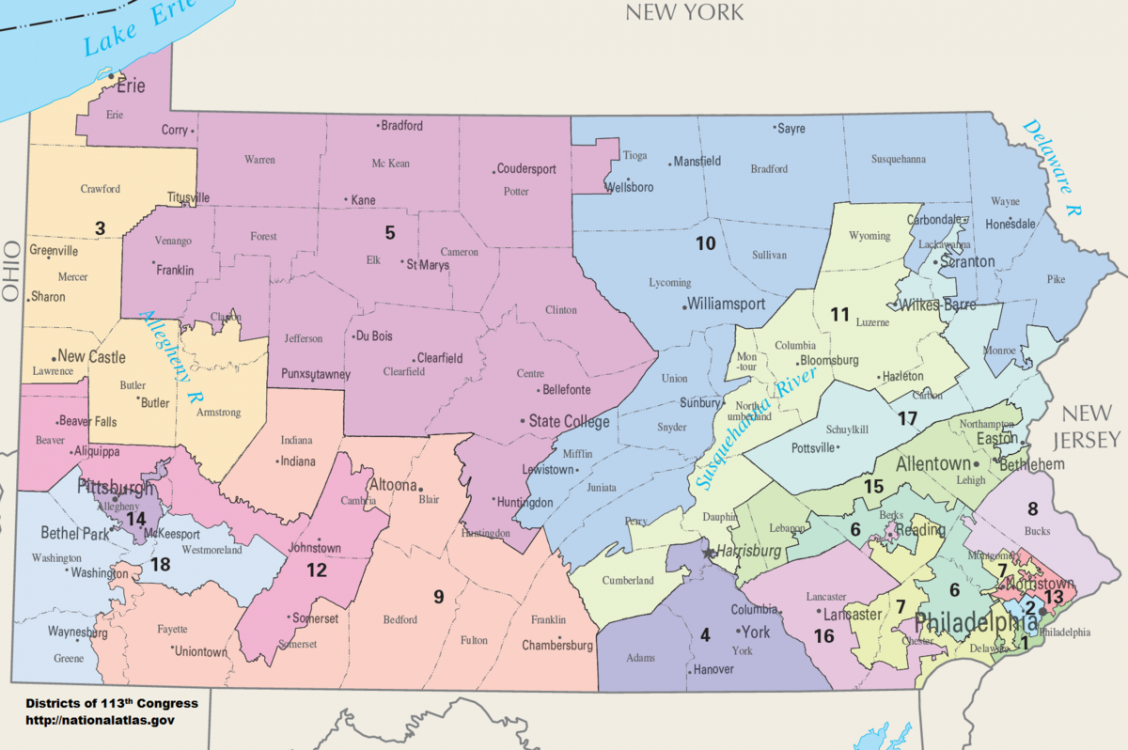
The Pennsylvania Supreme Court on Monday ruled that the state’s congressional map went so far to benefit Republicans that it “clearly, plainly and palpably” violated the state constitution.
The court, where Democrats have a 5-2 majority, blocked the use of the map in the 2018 midterm elections and ordered state lawmakers to begin to draw a new map.
The suit against the congressional map, which only challenged it under Pennsylvania’s state constitution, was one of the most watched voting rights cases in the country. The ruling could encourage groups to bring similar challenges against congressional gerrymandering cases in other states and bypass a ruling from the U.S. Supreme Court, which is currently considering two cases dealing with partisan gerrymandering.
Pennsylvania has been described as one of the worst gerrymandered states in the country, and analyses have found the map is responsible for at least three additional GOP seats in Congress. Republicans controlled the redistricting process in 2010 and drew the map to give them a considerable advantage. In the 2012, 2014 and 2016 elections they won 13 of the state’s 18 congressional seats, despite just winning about 50 percent of the vote.
The suit, brought by the League of Women Voters on behalf of 18 voters in each of the state’s congressional districts, said that GOP lawmakers had retaliated against Democratic voters for supporting Democratic candidates, violating the equal protection and free expression guarantees in the state constitution.
The justices gave GOP lawmakers until Feb. 9 to submit a new map and gave Gov. Tom Wolf (D) until Feb. 15 to approve it. Should the parties fail to reach an agreement on the plan, the justices said the court would move quickly on its own to develop a constitutional congressional map. The court said the new map could be expected by Feb. 19.
“Pennsylvania voters will finally be able to cast their ballots in districts that were fairly and constitutionally drawn,” David Gersch, one of the lawyers who argued the case on behalf of the plaintiffs, said in a call with reporters on Monday. “This is a tremendous day for Pennsylvania, tremendous day for the voters and it’s also a tremendous step by the Pennsylvania Supreme Court.The current map is the worst map in Pennsylvania’s history.”
The justices indicated the state’s congressional primary on May 15 would proceed as scheduled.
The court only issued an order on Monday and said a full opinion would follow. In a dissenting statement, the court’s two Republicans, Chief Justice Thomas Saylor and Sallie Updyke Mundy, said they would not have issued a ruling until the U.S. Supreme Court ruled on its partisan gerrymandering cases. They agreed with a lower court’s finding, however, that the map raised “substantial concerns” about constitutional viability. In a separate dissenting opinion, Mundy expressed concern with the vagueness of the court’s order, arguing it had instructed the legislature to redraw the state’s congressional map without giving it any guidance on how to do so.
Justice Max Baer (D) wrote an opinion joining the majority in part and dissenting in part. He said he would have held off on redrawing the congressional map until 2020 so it didn’t throw the state’s 2018 midterm elections into chaos and confusion.
At oral arguments in Harrisburg last week, lawyers for House Speaker Michael Turzai (R) and Senate President Tempore Joseph Scarnati (R) defended the map, saying that courts had never articulated a standard for when partisan gerrymandering was so egregious that it could be unconstitutional.
E. Mark Braden, a lawyer for Turzai, said it was inconceivable that a political body like a legislature, which is constitutionally tasked with drawing lines for Congress, would not take partisan considerations into account.
Turzai, Scarnati and Senate Majority Leader Jake Corman (R) criticized the Pennsylvania Supreme Court’s decision on Monday, saying they intended to ask the U.S. Supreme Court to block the order to redraw the map.
“Today’s ruling by the State Supreme Court is a partisan action showing a distinct lack of respect for the Constitution and the legislative process. The PA Supreme Court has overstepped its legal authority and set up an impossible deadline that will only introduce chaos in the upcoming Congressional election. The Court had this case since Nov. 9, 2017 ― giving it over 10 weeks to reach this decision,” they said in a joint statement. “Yet, it has elected to give the legislature 19 days to redraw and adopt the Congressional Districts. With matters the Supreme Court found unconstitutional in the past, it afforded the General Assembly four months to make corrections.”
The statement continued, saying: “It is clear that with this ruling the Court is attempting to bypass the Constitution and the legislative process and legislate themselves, directly from the bench.”
R. Stanton Jones, another lawyer for the plaintiffs, told reporters that any appeal would be unsuccessful because the challenge to the congressional map was only brought under the state constitution, not the federal one.
“It’s well established that the United States Supreme Court does not review decisions of state court that exclusively construe state law, which is the exact situation you have here,” Jones said. “When people talk about federalism, the concept of federalism, this is an important part of it. The United States Supreme Court doesn’t get to tell a state’s highest court what is state law, in this case Pennsylvania law.”
3 WAYS TO SHOW YOUR SUPPORT
- Log in to post comments












